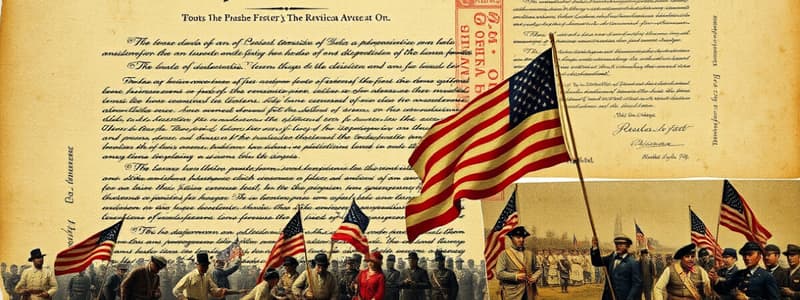Podcast
Questions and Answers
Match the following documents or concepts with their descriptions:
Match the following documents or concepts with their descriptions:
Declaration of Independence = Statement of colonial grievances against British rule Common Sense = Pamphlet encouraging support for independence Articles of Confederation = First form of government for the U.S. Bill of Rights = Document limiting governmental power and protecting individual liberties
Match the following acts with their effects on the colonies:
Match the following acts with their effects on the colonies:
Sugar Act = Taxed foreign molasses Quartering Act = Required colonists to house British soldiers Stamp Act = Taxed printed materials Townshend Acts = Taxed imported goods and tea
Match the following Enlightenment thinkers with their contributions:
Match the following Enlightenment thinkers with their contributions:
Thomas Jefferson = Primary author of the Declaration of Independence John Locke = Theorized the idea of natural rights Thomas Paine = Wrote pamphlet promoting independence James Madison = Key figure in drafting the Bill of Rights
Match the following events with their significance in the American Revolution:
Match the following events with their significance in the American Revolution:
Match the following phrases with their meanings:
Match the following phrases with their meanings:
Match the following components of the Revolutionary War with their outcomes:
Match the following components of the Revolutionary War with their outcomes:
Match the following provisions of the Declaration of Independence with their principles:
Match the following provisions of the Declaration of Independence with their principles:
Match the following phrases with related historical concepts:
Match the following phrases with related historical concepts:
Match the following events with their significance:
Match the following events with their significance:
Match the following terms with their definitions:
Match the following terms with their definitions:
Match the following compromises with their contexts:
Match the following compromises with their contexts:
Match the following outcomes of the Articles of Confederation with their descriptions:
Match the following outcomes of the Articles of Confederation with their descriptions:
Match the following delegates with their representation preferences:
Match the following delegates with their representation preferences:
Match the following components of Congress with their characteristics:
Match the following components of Congress with their characteristics:
Match the following historical terms with their descriptions:
Match the following historical terms with their descriptions:
Match the following lists with their examples:
Match the following lists with their examples:
Flashcards are hidden until you start studying
Study Notes
Declaration of Independence
- Composed by Thomas Jefferson, the document outlines colonial grievances against British rule.
- Draws heavily from Enlightenment thinkers, especially John Locke’s theory of natural rights emphasizing "consent of the governed."
- Establishes the principle that the government's purpose is to protect natural rights; if it fails, it can be overthrown.
- Similar to the Bill of Rights regarding limitations on governmental power and individual liberties.
- Fueled by the mantra "No Taxation Without Representation," asserting that colonists were unfairly taxed without a voice in Parliament.
Key Influences on Independence
- Thomas Paine's "Common Sense" significantly swayed undecided colonists towards independence.
- Increased opposition to British mercantilist policies led to organized resistance, including Committees of Correspondence, Non-importation Agreements, and the Boston Tea Party.
Major Events Leading to Revolutionary War
- Sugar Act: Tax imposed on foreign molasses; Stamp Act: Tax on printed materials.
- Quartering Act required colonists to house British soldiers; Townshend Acts taxed imported goods and tea.
- The Boston Massacre resulted in the death of five colonists at the hands of British soldiers.
- War began shortly after the Declaration of Independence, with American victory aided by local knowledge and French support.
- Mississippi River established as the western boundary post-war.
Articles of Confederation
- Served as the first governing document for the U.S. after declaring independence.
- Reflected American concern over a strong central government due to experiences under British rule.
- Established a decentralized political system granting power primarily to state governments.
- Limited effectiveness: Congress had no power to enforce laws, collect taxes, or maintain a standing army.
Successes and Failures of the Articles
- Successfully created a framework for governance of Western territories and facilitated the admission of new states.
- Problems included Congress’s dependence on state resources and inability to execute national policies.
Constitutional Convention (1787)
- Convened in Philadelphia to address weaknesses in the Articles of Confederation, primarily due to over-empowered states.
- Shays' Rebellion highlighted the need for a stronger national government and catalyzed the convention.
Great Compromise
- Resolved debate over state representation in Congress: a bicameral legislature was established.
- House of Representatives based on population, while the Senate ensured equal representation for all states.
Three-Fifths Compromise
- Addressed representation from states with large slave populations by counting three-fifths of the slave population for House representation.
Other Major Compromises
- Included agreements on Slave Trade, Taxation policies, and the Election of the President, reflecting the diverse interests of states.
Studying That Suits You
Use AI to generate personalized quizzes and flashcards to suit your learning preferences.




